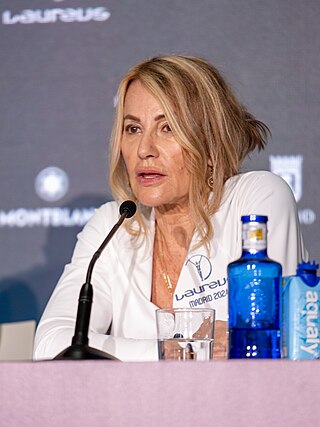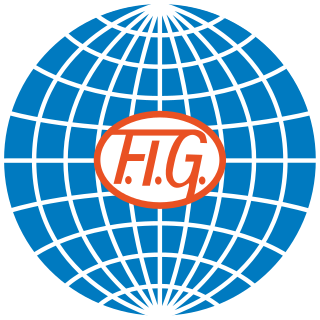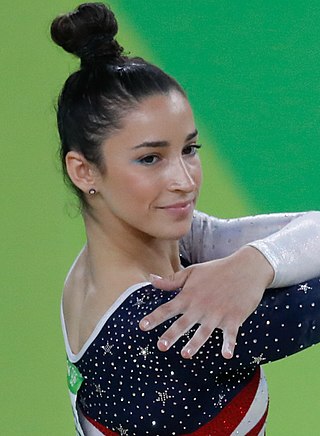
Gymnastics is a type of sport that includes physical exercises requiring balance, strength, flexibility, agility, coordination, artistry and endurance. The movements involved in gymnastics contribute to the development of the arms, legs, shoulders, back, chest, and abdominal muscle groups. Gymnastics evolved from exercises used by the ancient Greeks that included skills for mounting and dismounting a horse, and from circus performance skills.

Nadia Elena Comăneci Conner is a Romanian retired gymnast. She is a five-time Olympic gold medalist, all in individual events. In 1976, at the age of 14, Comăneci was the first gymnast to be awarded a perfect score of 10.0 at the Olympic Games. At the same Games, she received six more perfect 10s for events en route to winning three gold medals. At the 1980 Summer Olympics in Moscow, she won two more gold medals and achieved two more perfect 10s. During her career, she won nine Olympic medals and four World Artistic Gymnastics Championship medals.

Rhythmic gymnastics is a sport in which gymnasts perform on a floor with an apparatus: hoop, ball, clubs, ribbon and rope. The sport combines elements of gymnastics, dance and calisthenics; gymnasts must be strong, flexible, agile, dexterous and coordinated. Rhythmic gymnastics is governed by the International Gymnastics Federation (FiG), which first recognized it as a sport in 1963. It became an Olympic sport in 1984, with an individual all-around event. The group all-around competition was added to the Olympics in 1996. At the international level, rhythmic gymnastics is a women-only sport. The most prestigious competitions, besides the Olympic Games, are the World Championships, World Games, European Championships, European Games, the World Cup Series and the Grand Prix Series. Gymnasts are judged on their artistry, execution of skills, and difficulty of skills, for which they gain points. They perform leaps, balances, and rotations along with handling the apparatus.
Artistic gymnastics is a discipline of gymnastics in which athletes perform short routines on different apparatuses. The sport is governed by the Fédération Internationale de Gymnastique (FIG), which assigns the Code of Points used to score performances and regulates all aspects of elite international competition. Within individual countries, gymnastics is regulated by national federations such as British Gymnastics and USA Gymnastics. Artistic gymnastics is a popular spectator sport at many competitions, including the Summer Olympic Games.

The International Gymnastics Federation is the body governing competition in all disciplines of gymnastics. Its headquarters is in Lausanne, Switzerland. It was founded on 23 July 1881 in Liège, Belgium, making it the world's oldest existing international sports organisation. Originally called the European Federation of Gymnastics, it had three member countries—Belgium, France and the Netherlands—until 1921, when non-European countries were admitted and it received its current name.

Gymnastics events have been contested at every Summer Olympic Games since the birth of the modern Olympic movement at the 1896 Summer Olympics in Athens. For 32 years, only men were allowed to compete. Beginning at the 1928 Summer Olympics in Amsterdam, women were allowed to compete in artistic gymnastics events as well. Rhythmic gymnastics events were introduced at the 1984 Summer Olympics in Los Angeles, and trampoline events were added at the 2000 Summer Olympics in Sydney.
Gymnastics World Championships refers to a number of different world championships for each of the disciplines in competitive gymnastics. The International Gymnastics Federation (FIG) organizes World Championships for six disciplines: acrobatic gymnastics, aerobic gymnastics, artistic gymnastics, parkour, rhythmic gymnastics, as well as trampoline and tumbling. The International Federation of Aesthetic Group Gymnastics (IFAGG) organizes World Championships for the sport of aesthetic group gymnastics.

Anastasia "Nastia" Valeryevna Liukin OLY is an American former artistic gymnast. She is the 2008 Olympic all-around champion, a five-time Olympic medalist, the 2005 and 2007 World champion on the balance beam, and the 2005 World champion on the uneven bars. She is also a four-time all-around U.S. national champion, winning twice as a junior and twice as a senior. With nine World Championships medals, seven of them individual, Liukin is tied with Shannon Miller for the third-highest tally of World Championship medals among U.S. gymnasts. Liukin also tied Miller's record as the American gymnast having won the most medals in a single non-boycotted Olympic Games. In October 2011, Liukin announced that she was returning to gymnastics with the hopes of making a second Olympic team. Liukin did not make the 2012 Olympic team and retired from the sport on July 2, 2012.

United States of America Gymnastics is the national governing body for gymnastics in the United States. Established in 1963 as the U.S. Gymnastics Federation (USGF), USA Gymnastics is responsible for selecting and training national teams for the Olympic Games and World Championships. The revised 2018 mission of USA Gymnastics is focused on "creating a culture that empowers and supports its athletes and focuses on its highest priority, the safety and well-being of the athletes." USAG sets the rules and policies that govern the sport of gymnastics, including "promoting and developing gymnastics on the grassroots and national levels, as well as a safe, empowered and positive training environment, and serving as a resource center for members, clubs, fans and gymnasts throughout the United States."

At the 2008 Summer Olympics, three gymnastics disciplines were contested: artistic gymnastics, rhythmic gymnastics and trampoline. The artistic gymnastics events were held at the Beijing National Indoor Stadium on August 9–19. The rhythmic gymnastics events were held at the Beijing University of Technology Gymnasium on August 21–24. The trampoline events were also held at the Beijing National Indoor Stadium on August 16–19.
The Rhythmic Gymnastics World Championships are the world championships for the sport of rhythmic gymnastics. The tournament is promoted and organized by the Fédération Internationale de Gymnastique (FIG). It is one of the three tournaments in rhythmic gymnastics officially organized by FIG, as well as the Rhythmic Gymnastics World Cup and the gymnastics competitions at the Olympic Games. The first edition of the World Championships was held in 1963, a time when the sport was known as modern gymnastics. The current program of the World Championships contemplates both individual and group performances. In even non-Olympic years and the year before the Olympics, a team event is also contested. Two events are not competed at the World Championships anymore: individual rope and free hands.
The Artistic Gymnastics World Championships are the world championships for artistic gymnastics governed by the Fédération Internationale de Gymnastique (FIG). The first edition of the championships was held in 1903, exclusively for male gymnasts. Since the tenth edition of the tournament, in 1934, women's events are held together with men's events.

Alexandra Rose Raisman is an American retired artistic gymnast and two-time Olympian. She was captain of both the 2012 "Fierce Five" and 2016 "Final Five" U.S. women's Olympic gymnastics teams, which won their respective team competitions.

Max Antony Whitlock is a British artistic gymnast. With fourteen medals and six titles in Olympic and World Championships, Whitlock is the most successful gymnast in British history. He is also the most successful pommel horse worker in Olympic Games history, with two gold medals and one bronze.

Gabrielle Christina Victoria Douglas is an American artistic gymnast. She is the 2012 Olympic all-around champion and the 2015 World all-around silver medalist. She was a member of the gold-winning teams at both the 2012 and the 2016 Summer Olympics, dubbed the "Fierce Five" and the "Final Five" by the media, respectively. She was also a member of the gold-winning American teams at the 2011 and the 2015 World Championships.

Gymnastics at the 2016 Summer Olympics in Rio de Janeiro was held in three categories: artistic gymnastics, rhythmic gymnastics and trampolining. All gymnastics events were staged at the Arena Olímpica do Rio from 6 to 21 August 2016.

Simone Arianne Biles Owens is an American artistic gymnast. Her nine Olympic medals and 30 World Championship medals make her the most decorated gymnast in history, and she is widely considered one of the greatest gymnasts of all time. With nine Olympic medals, she is the fifth-most decorated female Olympic gymnast, and has the most Olympic medals earned by a U.S. gymnast.

Gymnastics at the 2020 Summer Olympics in Tokyo was held in three categories: artistic gymnastics, rhythmic gymnastics and trampolining. All gymnastics events were staged at the Olympic Gymnastic Centre, Tokyo in 2021.

The United States women's national artistic gymnastics team represents the United States in FIG international competitions.
Gymnastics competitions at the 2024 Summer Olympics in Paris will be contested in three categories: artistic gymnastics, rhythmic gymnastics and trampolining. The artistic and trampoline events will occur at the Bercy Arena, with the rhythmic events staged at Porte de La Chapelle Arena from 8 to 10 August.













